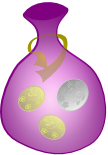How Much Can We Spend?
A country has decided to have just two different coins. Which totals can be made? Is there a largest total that cannot be made? How do you know?
Problem
How Much Can We Spend? printable worksheet
A country has decided to have just two different coins.
It has been suggested that these should be 3z and 5z coins.

The shops think this is a good idea since most totals can be made.
Image

| Image

| |
| $2\times3z+1\times 5z=11z$ | $7 \times 3z + 2 \times 5z = 31z$ |
Unfortunately some totals can't be made, for example 4z.
Which totals can be made?
Is there a largest total that cannot be made?
How do you know?
They have decided that they will definitely have 3z coins but can't make up their minds about the other coin.
Experiment with other pairings containing 3z, and explore which totals can be made.
Can you find a relationship between 3z, the second coin, and the totals that can and can't be made?
In other countries they have also decided to have just two coins, but instead of the 3z coins they have chosen a different prime number.
Can you find a relationship between pairs of coin values and the totals that can and can't be made with them?
NOTES AND BACKGROUND
The coin problem (also referred to as Frobenius coin problem or Frobenius problem) is a mathematics problem associated with the German mathematician Ferdinand Georg Frobenius and often introduced in the context of making exact change given the availability of coins of specific denominations. To read about it go to Wikipedia.
Getting Started
For example, you can make
8z (using 3z and 5z) and
9z (using 3z and 3z and 3z).
You can also make
10z (5z+5z)
11z (3z+3z+5z)
12z (3z+3z+3z+3z)
13z (3z+5z+5z)
14z (3z+3z+3z+5z)...
What do you notice about 8z, 11z, 14z, ...?
Student Solutions
Adam and Dylan had some great ideas, Sam explains his thoughts clearly:
Using $3z$ and $4z$ the highest number that can't be made is 5. This is because you can make 6, 7 and 8.
Mrs Dillon's year 7 class had a different way of showing 7 is the largest amount that can't be made;
We think using a $3z$ & $5z$ coin you can make all numbers except: 1, 2, 4, 7
We know you can make all other numbers because: we made all of the numbers from 11 to 20, and we can then get the rest by adding multiples of 10 (two 5z coins) onto any of these numbers.
We have also noticed that if you could get change, the 1, 2, 4 & 7 could also be made. So if you had to pay $1z$ then you could pay $6z$ and be given $5z$ back.
You can make $2z$ by paying $5z$ and getting $3z$ in change.
For $4z$ you can pay $9z$ and get $5z$ back.
Finally $7z$ can be paid by you paying $10z$ and getting $3z$ change.
Fantastic!
Tze Liang Chee looked into other possible combinations for other countries:
If you have $40z$ and $60z$, their highest common factor is 20, and so you can only make multiples of 20.
Teachers' Resources
Why do this problem?
This problem offers students opportunities to explore fundamental ideas about number theory in a simple context. They are encouraged to explore, conjecture, generalise and justify.
There are opportunities for older students who are familiar with algebraic manipulation or modular arithmetic to produce rigorous proofs.
Possible approach
This printable worksheet may be useful: How Much Can We Spend?
Introduce the context, just two coins 3z and 5z.
- 7 is the largest total that cannot be made
- 8 and all numbers above can be made
'Could we have predicted this?'
Are there any conjectures?
'What do you think would happen if the two coins were 3z and 6z?'
'What about 3z and 7z? 3z and 8z? 3z and 9z?......'
Allow some time for the students to test and refine their conjectures.
Bring the students together to share their findings and display their results, focussing on the largest total that cannot be made and the number that follows.
Were any of the original conjectures correct? Which?
Can they now use the combined results to make some generalisations?
Can they use their generalisations to predict what will happen for any pairing of 3z with another coin?
With older students who are familiar with algebraic manipulation, there is an opportunity here to express the findings algebraically in different ways and convince themselves that they are equivalent.
Ask students to consider now what would happen when the pairings contain:
7z and another coin...
any prime number value and another coin.
Key questions
How do you know you can make all the totals after a certain total?
Does it make a difference if the other coin is 1 more or 2 more than a multiple of 3z? (or 5z or 7z...)
Possible support
The whole class introductory activity as described above should provide the necessary support for all students to access this problem.
Possible extension
Can students explain/justify/prove their findings?
Ask students to consider what happens if neither coin is a prime number.
